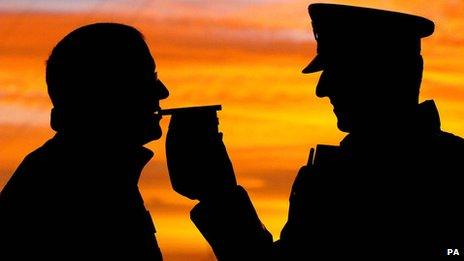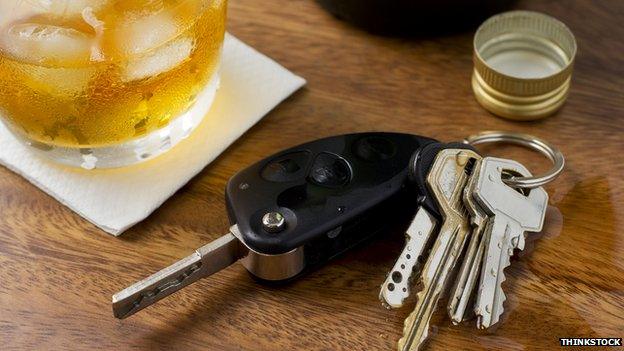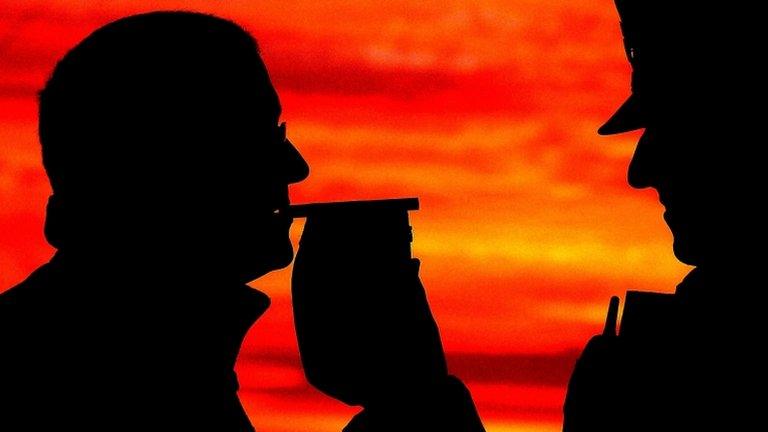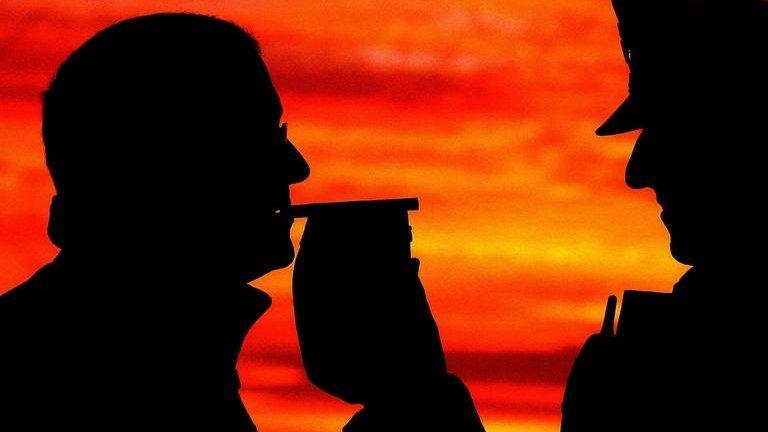Scotland to reduce drink-drive limit
- Published
- comments
Scotland to reduce drink-drive limit
The Scottish government has announced plans to reduce the country's drink-drive limit in time for Christmas.
Justice Secretary Kenny MacAskill has taken steps which, if approved by the Scottish Parliament, would mean a new limit being introduced on 5 December.
Under the plans, Scotland's blood alcohol limit would be cut from 80mg to 50mg in every 100ml of blood.
It would mean the legal limit in Scotland would be lower than in England - where the limit is 80mg in blood.
The UK Department of Transport said there were no plans to alter the drink drive limit south of the border.
In practice the change in Scotland could mean a glass of wine or a pint of beer would put a driver over the legal limit.
Draft legislation has been laid before parliament, and will bring Scotland's legal alcohol limits in line with much of Europe.
A public awareness campaign will warn drivers not to drink at all.
Save lives
Mr MacAskill said drinking and driving shattered families and communities, and that it was time to take action to reduce the risk on the country's roads.
He told BBC Scotland the plans to change the drink-drive limit had "broad support".
The justice secretary said: "The support comes not just from the police and law enforcement. It comes from those involved in road safety."
Asked why the government didn't simply apply a zero tolerance approach, Mr MacAskill said: "There are reasons why individuals may have alcohol in their system. It is also quite clear at the 50 (mg) limit, that is when impairment begins to kick in."
The Royal Society for the Prevention of Accidents (RoSPA) welcomed the move, and called for the rest of the UK to follow suit.

Drink-drive limit

The drink-drive limit, external in the UK is currently 80mg of alcohol in 100ml of blood.
However - like Scotland - the limit in Northern Ireland could be reduced from 80mg in blood to 50mg as part of proposals included in the Road Traffic (Amendment) Bill, external.
The bill is currently being considered by the Northern Ireland Assembly and could become law by early next year.
A 50mg limit would mean an average man would be limited to just under a pint of beer or a large glass of wine and women to half a pint of beer or a small glass of wine.

Sandy Allan, Rospa's Road Safety Manager in Scotland, said he believed the move would save lives and prevent injuries on Scotland's roads.
He added: "There is a considerable body of research which shows that reducing drink drive limits is effective in reducing drink-drive deaths and injuries. We would like to see the rest of the UK follow Scotland's example."
'Blatantly blitzed'
When asked about why a joint approach with the Westminster government on the issue was not agreed, Mr MacAskill said: "We did seek that, but it was the United Kingdom government that decided not to lower the limit despite, I think, a great deal of public support for it being lowered down there."
The latest estimates are that approximately one in 10 deaths on Scottish roads involve drivers who are over the legal limit.
Research has suggested that just one alcoholic drink before driving can make you three times as likely to be involved in a fatal car crash.
However, speaking on BBC Radio Scotland, George Goldie from the Institute of Advanced Motorists, said he did not believe the change would improve road safety and he questioned the motivation behind it saying it would "increase income" gathered from fines.
He added: "We have very few statistics, if any, to show how many accidents are caused by people who are marginally over the limit. Most of the accidents are caused by people who are blatantly blitzed.
"I'm much more concerned about improving driving, as opposed to improving the one in 10. I am much, much more interested in improving the nine in 10."
According to UK-wide figures from the Department of Transport, external, there were an estimated 6,680 road accidents involving illegal alcohol levels in 2012, making drink driving a factor in 4% of all accidents.
'Strengthening enforcement'
In 2012, an estimated 230 people were killed in drink drive accidents in the UK - accounting for 13% of all reported road fatalities. These are the most up-to-date figures available.
UK Road Safety Minister Robert Goodwill said tackling drink driving was a priority for the government at Westminster.
He said ministers were "strengthening enforcement" by removing the automatic right for drivers who failed a breathalyser test to demand a blood test and by introducing mobile evidential breath testing equipment next year.
However, he added: "We have no plans to alter the drink drive limit."
The Scottish government previously announced its intention to reduce the limit following a consultation, external which found that almost three quarters of those who responded backed the move.
- Published24 October 2014

- Published21 March 2013

- Published12 May 2014
